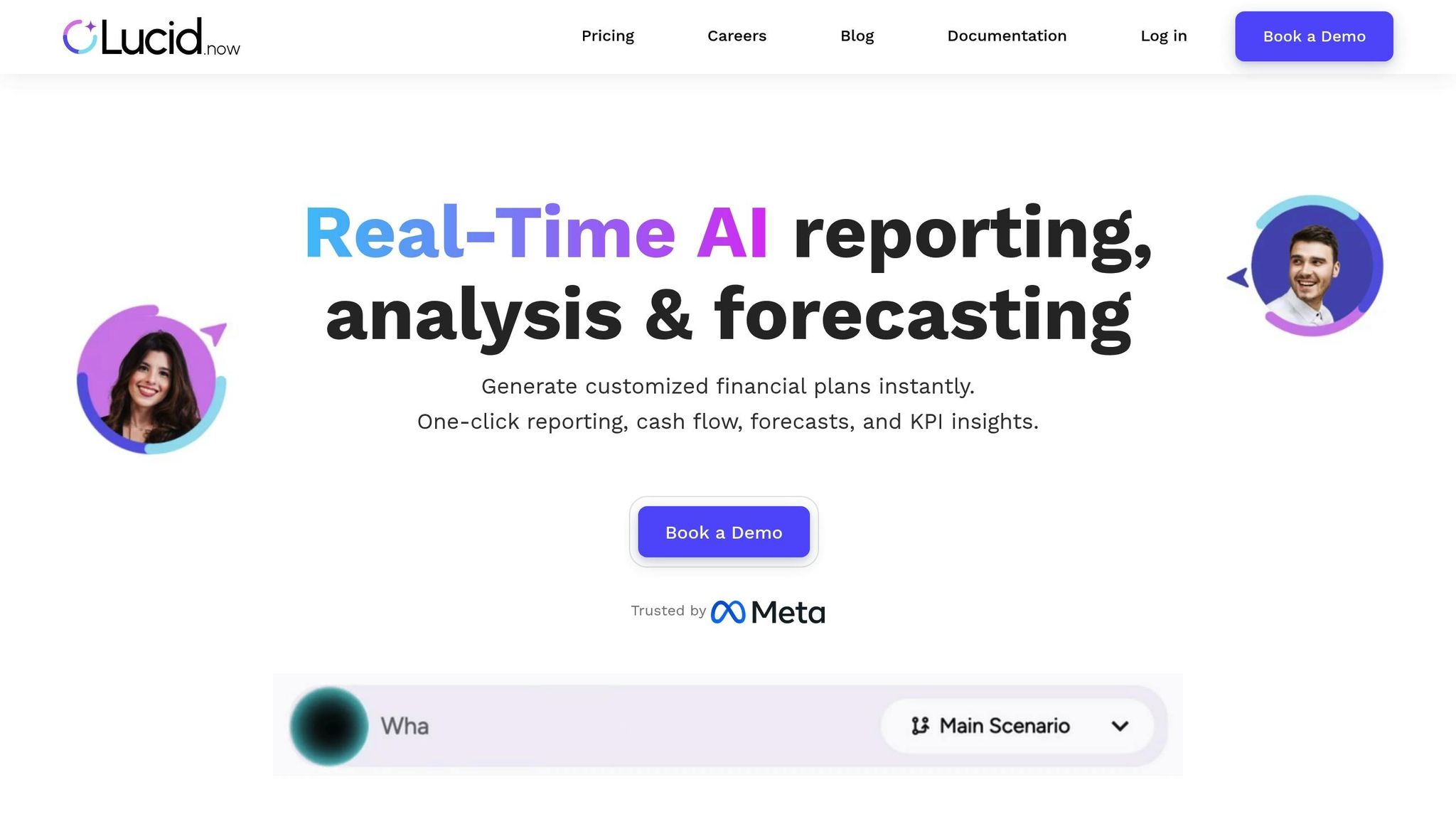Startups are turning to AI to tackle uncertainty. AI-powered tools like Lucid Financials help founders make faster, more accurate financial decisions by automating scenario planning, optimizing resource allocation, and integrating data from multiple platforms.
Here’s why startups are choosing AI over spreadsheets:
- Scenario Planning: AI generates multiple financial scenarios in seconds, reducing error rates to below 5%.
- Resource Allocation: AI analyzes spending and revenue to recommend smarter investments.
- Integration: Tools like Lucid sync with QuickBooks and payroll systems for real-time updates.
- Scalability: AI adapts as startups grow, saving time and improving decision-making.
Quick Comparison:
| Feature | AI Tools (e.g., Lucid) | Spreadsheets |
|---|---|---|
| Scenario Modeling | Real-time updates, <5% error rate | Manual, error-prone |
| Resource Allocation | Automated recommendations | Static budgets, manual |
| Integration | Seamless syncing with platforms | Limited, manual updates |
| Growth Scalability | Adapts to growth | Requires more effort |
AI tools are becoming essential for startups aiming to grow and compete in today’s fast-changing markets.
Scenario Planning with AI | Exclusive Lesson
1. Lucid Financials

Lucid Financials is an AI-powered financial planning platform tailored for startups navigating unpredictable markets. It eliminates the need for weeks of manual spreadsheet work by instantly generating financial scenarios that adjust to changing conditions. Let's dive into the platform's standout features.
Scenario Modeling
Lucid Financials simplifies scenario planning with its AI engine, which creates multiple financial projections in just a few clicks. Founders can explore best-case, worst-case, and real-world scenarios without the hassle of manual calculations. Even on the free plan, users can perform unlimited "what-if" analyses, making it accessible for bootstrapped startups. By automating these processes, Lucid claims to make financial planning up to 100 times faster than traditional methods. This efficiency allows teams to focus on strategy rather than spending hours crunching numbers.
Resource Allocation Optimization
The platform’s AI evaluates spending and revenue to identify the most effective ways to allocate resources. Real-time cost analysis helps startups track cash flow and determine which investments deliver the best returns. Lucid also keeps an eye on expenses, revenue, and cash flow, sending alerts when actuals deviate from planned scenarios. For hiring decisions - a major expense for most startups - the platform models the financial impact of scaling the team, offering clear insights for better decision-making.
Integration Capabilities
Lucid Financials works seamlessly with existing tools like QuickBooks, payroll systems, and banking platforms. By consolidating data from these sources, it provides real-time updates to financial scenarios without requiring manual data entry. This integration ensures founders always have an accurate and up-to-date view of their financial health, streamlining the decision-making process.
Growth Scalability
As startups grow, Lucid Financials evolves with them. Early-stage companies benefit from straightforward revenue and expense models, while more mature businesses can leverage advanced financial tools, industry benchmarks, and investor reporting features. The platform supports team collaboration by allowing unlimited view-only users and additional team members to contribute to financial planning. For larger organizations, the Enterprise tier removes all restrictions and offers enhanced features, including detailed industry benchmarks. These benchmarks help founders compare metrics like Customer Acquisition Cost (CAC) and valuation against sector-specific data to better understand their growth trajectory.
Lucid Financials ensures that startups, whether just starting out or scaling rapidly, have the tools they need to manage their finances effectively.
2. Standard Financial Planning Tools
When startups embark on their financial planning journey, they often rely on tried-and-true tools like Excel or basic accounting software. While these tools have been the backbone of many businesses for years, their limitations become glaring as companies grow and their decision-making processes become more intricate. These traditional methods lay the groundwork for exploring more advanced and automated solutions.
Scenario Modeling
For many early-stage startups, Excel is still the default choice for scenario analysis. Yet, a surprising 55% of companies skip scenario analysis entirely when adjusting forecasts. Why? Because traditional tools like spreadsheets often require a significant time commitment and can be overly complicated.
Scenario modeling in spreadsheets comes with its own set of hurdles. The process is painstakingly manual, involving repetitive formulas that increase the risk of errors. Additionally, integrating financial and operational data into these models is far from seamless.
"Scenario planning attempts to compensate for two common errors in decision-making - under prediction and over prediction of change. Most people and organizations are guilty of the first error." - Paul J.H. Schoemaker, Professor at the University of Pennsylvania's Wharton School
Collaboration is another major pain point. Excel was designed as a personal productivity tool, not for multiple users working simultaneously on the same model. This lack of collaborative functionality, combined with insufficient documentation, often leads to costly mistakes - especially in larger, more complex models.
Resource Allocation Optimization
Basic tools like spreadsheets also play a role in helping startups decide where to allocate resources. They allow founders to track expenses against budgets, highlight cash flow gaps, and guide spending priorities. These insights can be invaluable when every dollar counts.
However, these tools are inherently static. Each time market conditions or business assumptions shift, spreadsheets demand manual updates and recalculations, which can quickly become a time drain.
"If you can forecast accurately, you can manage your cash effectively." - Michael Burdick, Founder and Chief Strategy Officer, Paro
The stakes are high when it comes to resource allocation. In 2023, a staggering 82% of business failures were tied to cash flow problems. This highlights just how critical it is to have tools that not only monitor resources but adapt as conditions change.
Integration Capabilities
Standard financial planning tools offer varying levels of integration with other business systems. Popular accounting platforms like QuickBooks Online, FreshBooks, and Xero connect to banking systems, payroll platforms, and expense management tools. These integrations can simplify financial management by automating tasks, improving accuracy, and delivering real-time insights.
But even with these integrations, consolidating data often requires manual exports and imports, adding yet another layer of inefficiency.
Growth Scalability
While spreadsheets and basic tools might work for startups in their early days, they quickly hit a wall as companies scale. Growing businesses need dedicated software that automates data collection and reporting. Without this, the limitations of traditional tools become more pronounced.
For instance, only 20% of organizations can respond quickly to disruptions. This is largely due to the rigidity of their planning systems. On the other hand, companies with more adaptable planning processes are 3.4 times more likely to keep up with disruptions.
| Limitation | Impact on Growing Startups |
|---|---|
| Non-collaborative | Teams can't work together on financial plans, slowing decisions. |
| Error-prone | Complex formulas are harder to maintain and audit as models grow. |
| Weak reporting | Investor reporting becomes labor-intensive due to limited data manipulation options. |
| Limited ad hoc analysis | Organizing data by department, time periods, or scenarios is a challenge for strategic planning. |
"Effective scenario planning is rigorous and cross-functional. It should be deeply integrated into the company's strategic framework, identifying vulnerabilities and outlining responses to a range of financial and operational risks across products and markets." - Harvard Business Review
As startups grow, they often find themselves spending more time managing their planning tools than making strategic decisions. This inefficiency can stifle growth and make it harder to seize new opportunities or tackle challenges. These limitations signal the need for more advanced, AI-driven platforms that can scale alongside the business.
sbb-itb-17e8ec9
Advantages and Disadvantages
Building on the features discussed earlier, let's break down how AI-powered tools are reshaping financial planning. Here's a closer look at the key differences between AI-driven platforms and traditional methods.
Scenario Modeling Performance
AI platforms like Lucid Financials revolutionize scenario planning. What was once a static, time-intensive process is now dynamic and real-time. These tools process massive datasets, uncovering subtle patterns and relationships between performance drivers. The result? More detailed, tailored forecasts with error rates below 5%. In contrast, traditional models require manual updates for every assumption change, leading to delays and potential mistakes.
Resource Allocation Efficiency
Traditional tools depend on static budgets and manual tracking, making it tough to adapt to fast-changing markets. AI-powered platforms solve this by using advanced algorithms to analyze historical data, market trends, and economic indicators. This allows them to recommend resource allocations that are both precise and adaptable. The outcome is not only more accurate forecasting but also less time spent on labor-intensive tasks.
Integration and Automation
Basic accounting tools often lack robust integration, forcing users to manually consolidate data from various sources. Lucid Financials, on the other hand, integrates effortlessly with platforms like QuickBooks, payroll services, and banks. This real-time syncing and analysis save time and reduce errors. For example, AI tools have been shown to cut case resolution times by 45% in the financial sector while boosting customer retention by 35%. Traditional tools simply can't match this level of automation and connectivity.
Scalability for Growth
Scalability is where AI truly shines. As Prince Kumar Thakur, a Technical Content Writer, notes:
"AI is no longer an emerging technology - it is the differentiator between startups that scale and those that stagnate."
The numbers back this up: businesses using AI in financial planning report 30% faster planning cycles, forecasts that are 20% to 40% more accurate, and productivity gains of 20% to 30%. Meanwhile, 90% of startups fail, often due to inefficiencies and slow decision-making. Traditional spreadsheet-based systems demand increasing manual effort as a company grows, making them less practical over time. AI tools, however, adapt easily to businesses of all sizes, offering unmatched scalability.
| Feature/Aspect | Lucid Financials | Standard Financial Planning Tools |
|---|---|---|
| Scenario Modeling | AI-driven, real-time updates with <5% error rates | Static, manual updates prone to errors |
| Resource Allocation | Optimized with continuous analysis | Limited by static budgets and manual tracking |
| Integration Capabilities | Seamless syncing with QuickBooks, payroll, and banks | Minimal, requiring manual data consolidation |
| Growth Scalability | Supports growth with faster planning and accurate forecasts | Requires more manual effort as companies grow |
The shift toward AI in finance is clear. Adoption rates jumped from 45% in 2022 to a projected 85% by 2025, with 60% of businesses already using AI across multiple areas. While traditional tools might work for early-stage startups, their limitations in efficiency, decision-making, and scalability make AI the smarter choice for long-term growth. These advantages set the stage for a deeper dive into how AI impacts startup success.
Summary
When comparing AI-powered financial planning tools to traditional methods, it's clear that AI platforms like Lucid Financials are revolutionizing how startups handle scenario planning. These platforms replace outdated, error-prone processes with dynamic, real-time systems that enhance decision-making, scalability, and resource allocation.
The numbers speak for themselves: AI-driven tools can speed up planning cycles by 30% and boost forecast accuracy by 20%–40%. On the other hand, traditional methods often rely on manual processes that contribute to 52% of operational incidents in financial organizations due to human error. This efficiency advantage allows startups to address challenges related to growth and scaling more effectively. As finance leader Nicolas Boucher aptly states:
"AI is here to stay and ignoring it would be like ignoring Excel when it was released 40 years ago."
For startups, scalability is a game-changer. While traditional spreadsheets demand more manual effort as a company grows, AI platforms adapt effortlessly to businesses of any size. They also provide the predictive insights necessary for smarter resource allocation.
AI tools like Lucid Financials go even further by eliminating the need for manual data consolidation. Instead, they offer instant insights that drive better decisions. Companies leveraging these tools have reported a 25% improvement in gross margin and an 85% increase in sales growth.
For startups looking to scale, adopting AI-powered financial planning tools is no longer optional - it’s essential. These platforms deliver unmatched accuracy, automation, seamless integration, and adaptability, making them indispensable for modern operations. With AI adoption in finance expected to hit 85% by 2025, early adopters will gain a major edge in today’s data-driven world.
Beyond improving accuracy, AI-powered planning sets startups up for long-term growth. Already, 64% of businesses acknowledge AI's ability to boost productivity. While traditional tools might handle basic tasks, AI platforms offer the strategic framework startups need to thrive in a competitive landscape. This shift to AI-driven financial planning is quickly becoming the cornerstone of success for modern startups.
FAQs
How does AI make scenario planning faster and more accurate than using spreadsheets?
AI is transforming scenario planning, making it quicker, more precise, and less prone to mistakes than traditional spreadsheet-based methods. Instead of tedious manual calculations, AI handles data analysis automatically, sifting through massive datasets in seconds. It spots trends and patterns that might otherwise go unnoticed, allowing businesses to generate reliable forecasts and evaluate multiple scenarios in no time.
Another game-changer is how AI keeps forecasts up-to-date by incorporating new data in real-time. This means startups can respond to shifting market conditions without the usual delays or errors that come with manually updating spreadsheets. By simplifying these processes, AI empowers businesses to make smarter, data-driven decisions with greater confidence.
How can AI-powered tools like Lucid Financials help startups with resource allocation?
AI-driven tools such as Lucid Financials are transforming how startups manage their resources. By automating tedious tasks and offering real-time insights based on data, these tools allow founders and teams to make quicker, more informed decisions. They also help businesses evaluate different scenarios, adjust strategies on the fly, and use resources efficiently to reduce waste and increase productivity.
Lucid Financials stands out with features like instant financial planning, scenario analysis, and access to industry benchmarks. These capabilities enable startups to foresee potential challenges, focus on the right investments, and allocate their resources wisely. The result? Businesses can grow and scale with greater confidence.
How can AI integration improve financial planning for growing startups?
AI has the potential to transform how startups approach financial planning. By automating repetitive tasks, providing instant insights, and improving forecasting accuracy, it frees up time for startups to concentrate on making strategic growth decisions instead of getting bogged down in manual processes.
When integrated with tools like accounting platforms, payroll systems, and banking apps, AI offers startups a complete picture of their financial health. It can sift through massive amounts of data to spot trends, fine-tune resource allocation, and enhance financial clarity - empowering founders to make quicker, smarter decisions as their businesses grow.


